Do you have some expertise to share, or are you thinking about monetizing your skills via a course? Are you an expert in a given field or with a practical skill, or are you a thought leader for whom a premium course is a logical next business step? If the answer to any of these is yes, Udemy is a platform that’s sure to be on your radar as you take the next step towards selling your course.
In this review, we’re going to take a look at whether Udemy is right for you as a course creator or instructor, how it works, and whether selling your course on Udemy is the right choice in 2024!
What is Udemy?

Udemy is one of the internet’s best-known online education platforms, featuring over 210,000 video courses made available to 62 million students and 15,000+ enterprise customers. These courses are produced by independent instructors, whom Udemy aids by providing training resources in order to maximize the quality of what’s available on their platform.
Who Can Use Udemy?
Udemy has two broad user groups—learners, who purchase courses or sign up for subscription memberships, and instructors, who create the products that are available on the platform and earn a proportion of sales revenues.
The real customers of Udemy are the learners or students, so the site is tailored to them. Many of the reviews you’ll see of Udemy online take a student perspective, but it’s important not to neglect instructors or those who may look at Udemy as a potential revenue stream. It is very possible to make money on Udemy, as we’ll look at later, and it’s worth knowing how the platform works in order to maximize your earning potential.
What Can You Sell with Udemy?
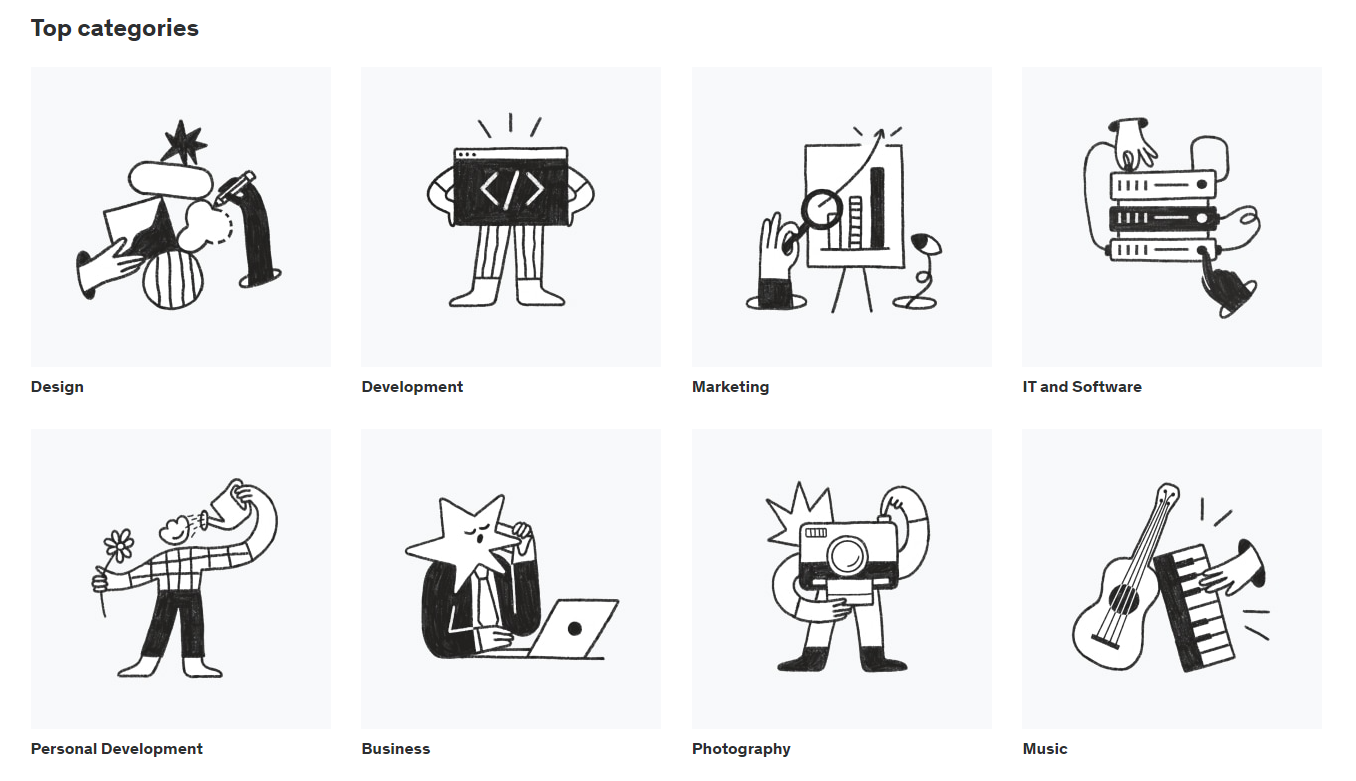
Udemy’s bread and butter is online courses, but within this digital product category you can explore just about any niche you want to. There aren’t too many restrictions on what sort of course you can sell, and the more unique your subject matter, the better. That said, Udemy isn’t going to be giving you the option to sell much more than a course, so you’ll have to look elsewhere if you have other digital products to offer such as eBooks or a premium community.
How Does Udemy Work?

Udemy provides a platform for independent coaches and skilled individuals to offer their expertise in the form of video instruction, and learners can pay for these either with one-off payments or via a personal subscription plan.
When a learner completes a course, they are given a certificate of completion. This, in addition to the ability to take courses at their own pace, makes the platform an attractive proposition for many learners in a variety of areas—Udemy features courses covering a broad range of topics, and there are plenty of free courses to get started with too.
Looking at Udemy from the perspective of an instructor or course creator, it offers a chance to take advantage of the platform’s reach and reputation to win new customers. You can upload courses as short as 30 minutes, but there’s nothing keeping you from generating hundreds or even thousands of hours worth of content.
Udemy learners (so, your potential customers) need to create an account on the platform to get started, and then it’s a matter of searching for your course or browsing the platform. Once they choose a course, they add it to their cart and purchase lifetime access.
To get started teaching on Udemy, you can use the platform’s Marketplace Insights tool to pick a topic and then start by recording your video. The platform has an Instructor Support Team which can review your test video to give you feedback on your content, or you can just go ahead and upload it.
At that point, your course is reviewed by Udemy to see if the content meets their quality standards. Their Review Team evaluates your course and provides feedback if needed, so you can make edits and then resubmit it if it comes to that. Once you’re approved, your course will be published to the platform and you’ll be listed on the Udemy marketplace.
If you want to earn money for your course–and let’s face it, you probably do–you also need to register to be a Premium Instructor with Udemy.
What is Udemy’s Revenue Model?
Once you’re a Premium Instructor with Udemy, you’re able to set a price for your course. There’s no fee for doing so, but the revenue share between yourself and Udemy actually depends on whether your students land on their purchase via your promotional efforts or not.
Essentially, you’re given a coupon or referral link, and when students use it to purchase your courses, you get to keep 97% of the revenue. So, when you market your Udemy courses via other channels or link people through to your course, you need to make sure that it’s being done using that referral link or coupon code.
If students find and purchase your course by browsing the marketplace or simply neglect to use your referral or coupon, you only get to keep 37% of your revenue. As such, Udemy effectively takes a 3% fee on each sale you make for letting you use the platform, and a 60% fee on top of that if students don’t use your referral link or coupon code.
Udemy Business works a little differently. The platform sets aside 25% of monthly subscription revenue from their Udemy Business customers for the instructors who produce all of this course content. The pool is then shared out based on what proportion of the total course content consumed was yours.
What are Users Saying about Udemy?
One of the best ways to judge the quality of a platform is by what users say about it, so we’ve looked at review site Trustpilot to gauge the prevailing temperature around Udemy. All in all, users aren’t too hot on the platform as far as review score goes, with Udemy scoring an underwhelming 2.1 out of 5 from over 1300 reviews. There are also some instructor reviews in the batch detailing poor experiences with payments and customer support.
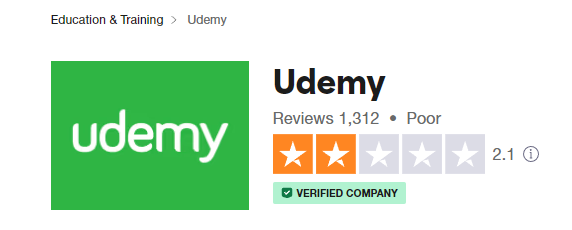
That being said, Udemy rates quite a bit higher than competitors like Skillshare and Coursera, and while 42% of its reviews are 1-star, 35% are 5-star and 11% are 4-star, meaning that the platform is actually quite polarizing. Here’s a look at some of those differing opinions:
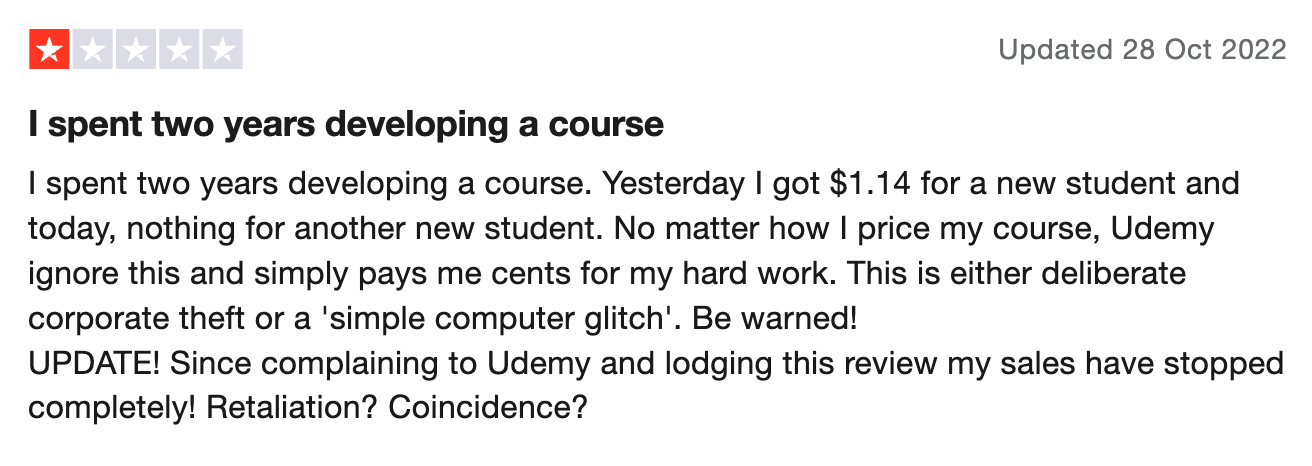
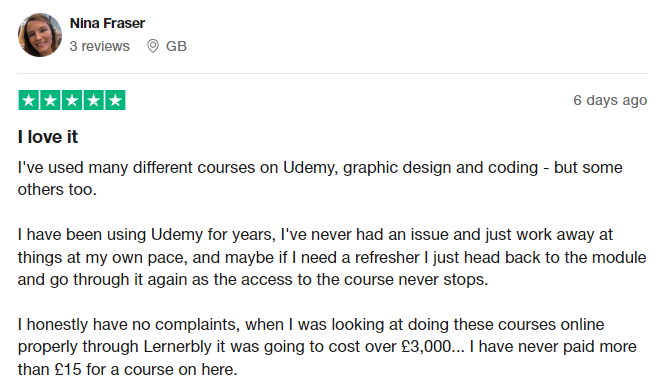
Is Udemy Worth It? Pros and Cons
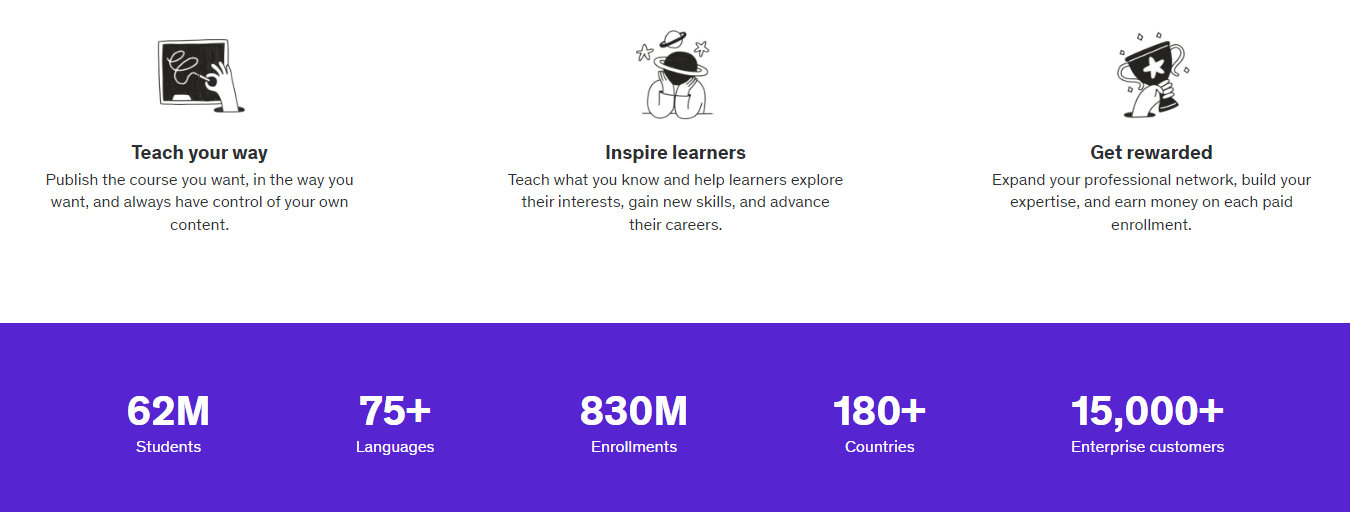
Udemy Pros
- Vast student pool
Udemy has a lot of reach and is known as a premium destination for courses, so if you’re able to gain visibility on the platform, you can potentially get lots of eyes on your product and increased sales. - Free courses
The availability of free courses of two hours or less helps to convert Udemy learners, and you can also create free courses as samples for interested students. - Certificates of completion
The professional world loves an official-looking document from a recognized institution, and Udemy gives you an opportunity to bulk up your students’ resume in this way. - Course building made easy
While the core feature of Udemy’s courses is video, you can jazz things up with various interactive additions like quizzes, assignments, and Q&As. - Course reviews
Udemy has implemented a review feature to help learners find the best courses, and this is an opportunity for you to get discovered via outstanding quality and customer service. - Instructor support and resources
Udemy offers plenty of support to instructors, including the review of test videos and a learning center. This can help you improve your product.
Udemy Cons
- Approval process
Before publishing courses, they need to be approved by Udemy. While this makes sense when it comes to establishing a quality standard, it puts you at the mercy of the platform. - Heavy fees
Udemy charges a 3% fee even if you wrangle sales yourself, and if students come from elsewhere or just forget to use your coupon, the platform will keep 63%. That number jumps to 75% for Udemy Business subscriptions. - Saturation
With the sheer quantity of courses available on Udemy, you might find yourself competing with lots of others unless you’re in a very niche area. - Deal confusion
Udemy’s deals and sales can throw pricing out of whack, and instructors have to gain a quick understanding of how the deal agreement works.
Should You Use Udemy in 2024?
Udemy is one of the top destinations for consumers looking to learn different skills in 2024, but that doesn’t necessarily mean that it’s where you need to list your course. It’s one of many top course platforms and therefore not the place to be, and therefore you aren’t going to lose out if you decide on another platform with friendlier fees and less gatekeeping.
Furthermore, Udemy has picked up something of a reputation for having a good selection of beginner and intermediate level courses but somewhat less on the expert front, with many users being left unsatisfied with course content. As such, if you really want to cement your own brand as a premium product that goes the extra mile and offers an advanced level of content, Udemy may not be the right platform for you.
Ultimately though, the main argument against using Udemy is its revenue sharing model. While the 3% platform fee is fair, jumping to 63% just because sales aren’t made directly through your marketing efforts feels extremely rough—especially since Udemy is wholly reliant on instructors to have any sort of product in the first place!
Sell Your Courses on Whop Instead!

So, if you’ve got a course to sell or knowledge to share, do yourself a favor and sell with a platform that helps you to make as much money as possible.
Whop is exactly that platform, charging a 3% transaction fee on sales you make, and offering you all the support and tools you need to make courses that really stand out as being best-in-class, backed up by verified user reviews.
With Whop you can turn your course into a money-making machine by creating a paid community around your course, starting an affiliate program, selling complementary digital products like ebooks and coaching, and so much more. It only takes a few minutes to get set up on Whop, so check out the platform or talk to the team today!
Udemy FAQs
How often does Udemy have sales?
Udemy has regular sales for students throughout the year - almost every month of the year in fact. The most common Udemy sales are on specific courses, but students can also find sales on subscription plans. For instructors, this means that on sales occurring not through instructor promotion but rather Udemy promotion, instructors only received 37% revenue of the course sale price. With discount sales happening so often this affects your earning potential.
What's better than Udemy?
There are many alternatives to Udemy for course creators and students, and a list of the best Udemy alternatives can be found here.
How much does Udemy pay instructors?
Udemy pays instructors 97% of instructor-promoted sales and 37% of Udemy-promoted sales.





